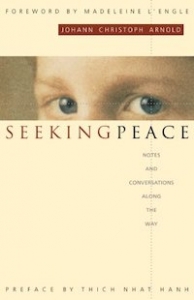Peace in Troubled Times by Amy Nicholson

Seeking Peace:
Notes and Conversations
Along the Way
By Johann Christoph Arnold
Plough, 2013
$12 239 pp.
Peace I leave with you, my peace I give unto you: not as the world giveth, give I unto you. Let not your heart be troubled, neither let it be afraid.
– John 14:27
Recalling pre-pandemic days at Mass when the priest would invite us to “pass the peace” with a handshake, I’d smile as I shook the hand of the person in the pew in front of me and say Peace be with you. I’m not sure I ever really thought about the word. Even if I did, the concept of it seems foreign or at least out of reach to me today. The media is the ever-present voice in our heads telling us to be fearful of COVID, to be angry with politicians, to fight for our right to get the things we want. What did Jesus mean by “not as the world giveth”? Does the world even try to offer us peace anymore? Yet Jesus said he was leaving us with his peace. As his followers, where are we to find the peace he left us? How does it play out in our daily lives?
I certainly didn’t have much peace in the fall of 2020. I almost didn’t return to my job as a substitute teacher this year. Contrary to Jesus’s admonition to his followers in John 14:27, my heart was troubled. I was afraid. What if I worked and contracted the virus at school? Not only would I be sick, I’d run the risk of exposing my family to sickness as well. With fear and anxiety over the pandemic coming at me from all sides, as well as the country’s racial tensions and political unrest, peace eluded me. Perhaps that is one of the reasons the title of this book appealed to me. Maybe it could offer some strategies.
But Seeking Peace is not a self-help book, nor does it offer a quick fix for the problems of the world. What it does offer is a different definition of peace, disciplines to cultivate a shift in mindset to a simpler way, Jesus’s way. The author, Johann Christoph Arnold, proposes that the idea of peace stretches beyond the absence of war. His conceptualization of war is broad. Quoting his grandfather, Ebhard Arnold (which he does several times in the book), he points to the idea that instances of injustice, neglect, and atrocities like starvation can also be included in the definition of war. Arnold presents the definition of peace as the presence of justice, rightness with God, and harmony with others. He goes further and discusses the peace Jesus presents in the Bible and the idea of it as a social cause, as well as personal peace, from which harmony with others is born.
This idea of personal peace resonates with me. Over the years, I’ve come to realize that when I am calm, I bring that peace into the classroom. I see it as a gift. But this year I was anxious. I wanted to exude peace, but I couldn’t bring what I didn’t have. Serenity has to start somewhere. Where was I to find it? I knew I’d have to wrestle with my own inner truth before I could step out in faith.
At the risk of sounding trite, Arnold seems to agree with the lyrics of Jill Jackson’s 1955 hymn: “Let there be peace on earth and let it begin with me.” Indeed, in the preface, Buddhist monk Thich Nhat Hanh states that even if one were to rid the world of every weapon, war would remain as long as it was still rooted in people’s hearts. Peace in our world needs to begin with peace in our hearts. According to the author, the root causes of war are property and the structures of capitalism. As long as we own things—or desire to own them—we will fight over them. “Each of us creates an atmosphere around himself,” he writes. It isn’t until we begin to uproot greed and pride in ourselves that we begin to approach a hope for harmony with our neighbor. Even if we don’t harbor such covetous feelings, even if our hearts are full of generosity and goodwill towards others, fear and anxiety can stop us from stepping outside our own front door.
As perfect peace will never be attained this side of heaven, Arnold sets out not to help the reader attain the unattainable, but, as he says, “offer you stepping stones along the way—and enough hope to keep you seeking peace.” Among these “stepping stones” are simplicity, silence, prayer, trust, forgiveness, and service. Arnold uses carefully chosen anecdotes from friends, family members, members of his community, and acquaintances to illustrate each of his 15 “stepping stones.” These are not saccharine stories intended to fill up space. They are stories of life-altering events, complete with the messiness and sinfulness that plague us all as humans. If Arnold’s intent was to write a true-to-life volume replete with man’s vulnerability and God’s paradoxical kingdom where people love their enemies, death precedes life, and waiting on the Lord means being used up by him to serve others, he succeeded.
In the end, we circle around to the beginning. In the forward to Seeking Peace, Madeline L’Engle alludes to a sermon she heard where she learned that “peace is not always something you ‘do’; it is a gift you can give.” At the beginning of the school year, when I was considering the risk of contracting COVID and evaluating whether or not I would return to school, I was filled with anxiety, but through a sense of obedience and service (two of Arnold’s stepping stones), I did return. It grew easier with time. The more time I spent in school, the safer I felt. I took on more assignments. Now, I don’t think twice about accepting them. I’m glad I made the decision to trust God in this. These are trying and fearful times if we are looking to the world for our peace. This book keeps us look to God for the peace only he can bring. By his grace, we can be at peace and bring that gift to others.
Amy Nicholson hopes to encourage and inspire others through her writing. She has been published in Country Woman, The Old Schoolhouse, The Lookout, and other publications. In addition to writing and discovering grace in ordinary places, Amy substitute teaches. Visit her at: www.amynicholson14.wordpress.com.





Leave a Reply
Want to join the discussion?Feel free to contribute!